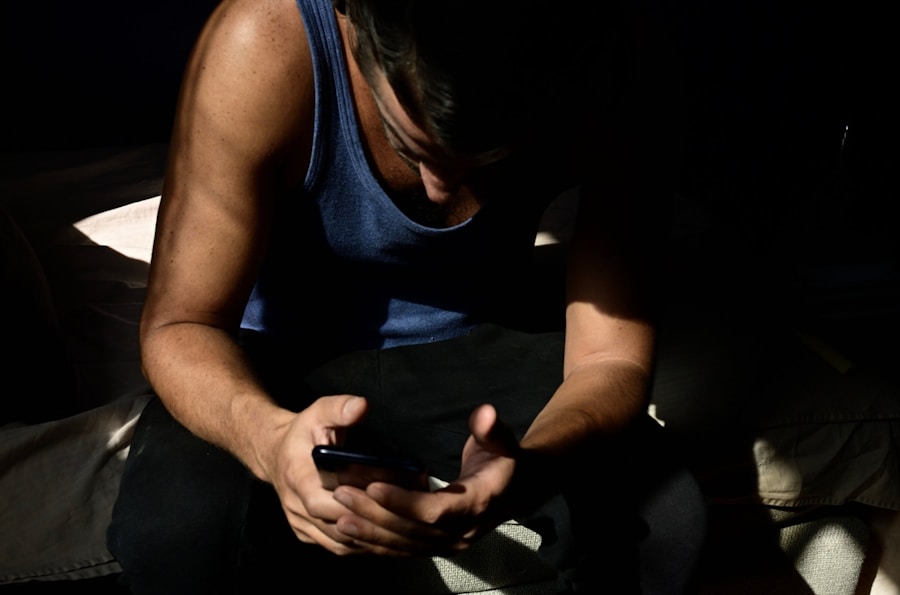In recent years, social media has become an integral part of daily life, shaping how you communicate, share experiences, and perceive the world around you. Platforms such as Instagram, Twitter, and Facebook have transformed the landscape of social interaction, offering a space for connection and expression. However, while these platforms can foster community and support, they also present unique challenges, particularly concerning mental health.
As a man navigating this digital terrain, you may find yourself grappling with the pressures and expectations that arise from constant online engagement. The impact of social media on mental health is profound and multifaceted. For many men, the curated images and narratives presented online can lead to feelings of inadequacy and self-doubt.
The rise of social media has coincided with an increase in mental health issues among men, highlighting the need for a deeper understanding of how these platforms influence your emotional well-being. As you explore the complexities of masculinity in the digital age, it becomes essential to examine the pressures that social media imposes and how they can affect your mental health.
Summary
- The rise of social media has had a significant impact on men’s mental health, leading to increased pressure to conform to unrealistic standards of masculinity.
- Social media use has been linked to higher rates of depression and anxiety in men, highlighting the negative effects of toxic masculinity and gender stereotypes perpetuated online.
- Men’s body image and self-esteem are often negatively affected by social media, contributing to feelings of loneliness and isolation.
- Social media can influence male relationships and communication, leading to potential challenges in forming and maintaining connections.
- Strategies for men to protect their mental health in the age of social media include setting boundaries, seeking support, and promoting positive representations of masculinity.
The Pressure to Conform to Unrealistic Standards of Masculinity on Social Media
As you scroll through your social media feeds, you are likely bombarded with images and messages that promote a narrow definition of masculinity. These portrayals often emphasise physical strength, emotional stoicism, and material success, creating an unrealistic standard that can be difficult to attain. The pressure to conform to these ideals can be overwhelming, leading you to question your worth and identity.
You may find yourself comparing your life to the seemingly perfect lives of others, which can exacerbate feelings of inadequacy. Moreover, this pressure is not just about personal appearance; it extends to lifestyle choices and behaviours as well. The expectation to embody a certain type of masculinity can lead to a suppression of emotions and vulnerability, which are often viewed as weaknesses in the male experience.
As you navigate these societal expectations, it is crucial to recognise that these standards are not only unrealistic but also harmful. Embracing a more authentic version of masculinity that allows for emotional expression and individuality can be a powerful step towards improving your mental health.
The Link Between Social Media Use and Depression and Anxiety in Men

Research has increasingly highlighted a concerning link between social media use and mental health issues such as depression and anxiety among men. As you engage with these platforms, the constant exposure to idealised images and lifestyles can lead to feelings of inadequacy and low self-esteem. You may find yourself trapped in a cycle of comparison, where each scroll reinforces negative thoughts about your own life and achievements.
This cycle can contribute to heightened levels of anxiety, as you feel pressured to measure up to the standards set by others. Furthermore, the addictive nature of social media can exacerbate these feelings. The instant gratification provided by likes and comments can create a temporary boost in mood, but this is often followed by a crash that leaves you feeling more isolated than before.
The more time you spend on these platforms, the more likely you are to experience symptoms of depression and anxiety. It is essential to recognise this connection and consider how your social media habits may be impacting your mental health.
The Role of Social Media in Perpetuating Toxic Masculinity and Gender Stereotypes
Social media plays a significant role in perpetuating toxic masculinity and reinforcing harmful gender stereotypes. As you engage with content that glorifies aggression, dominance, and emotional suppression, you may internalise these messages without even realising it. This can lead to a distorted understanding of what it means to be a man, pushing you further away from healthy expressions of masculinity.
The portrayal of men as invulnerable and emotionally detached not only harms your mental health but also affects your relationships with others. Moreover, the viral nature of social media means that harmful stereotypes can spread rapidly, influencing perceptions on a global scale. You may encounter memes or posts that trivialise mental health struggles or promote harmful behaviours as markers of masculinity.
This environment can create a culture where seeking help is seen as a weakness rather than a strength. Challenging these narratives is crucial for fostering a healthier understanding of masculinity that embraces vulnerability and emotional expression.
The Impact of Social Media on Body Image and Self-Esteem in Men
Body image issues are not exclusive to women; men also face significant pressures regarding their physical appearance, particularly in the age of social media. As you scroll through images of chiselled abs, perfect skin, and idealised physiques, it is easy to feel inadequate about your own body. The constant exposure to these unrealistic standards can lead to body dissatisfaction and low self-esteem, which can have far-reaching effects on your mental health.
The impact of social media on body image is compounded by the prevalence of filters and photo editing tools that create an unattainable standard of beauty. You may find yourself questioning your worth based on how closely you align with these digitally altered images. This can lead to unhealthy behaviours such as excessive dieting or over-exercising in an attempt to achieve an idealised body type.
Recognising the influence of social media on your body image is essential for developing a healthier relationship with yourself and fostering self-acceptance.
The Connection Between Social Media and Loneliness and Isolation in Men

Despite being designed for connection, social media can paradoxically contribute to feelings of loneliness and isolation among men. As you engage with others online, it may create an illusion of connection while simultaneously distancing you from meaningful relationships in real life. You might find yourself spending hours scrolling through feeds instead of reaching out to friends or family members for genuine interaction.
This disconnect can leave you feeling more isolated than ever. Moreover, the curated nature of social media often leads to a skewed perception of reality. You may see others sharing highlights from their lives while neglecting to showcase their struggles or vulnerabilities.
This can create a sense of alienation, making you feel as though everyone else is living a fulfilling life while you are left behind. Acknowledging this disconnect is vital for fostering genuine connections outside the digital realm and combating feelings of loneliness.
The Influence of Social Media on Male Relationships and Communication
Social media has transformed how you communicate with others, including friends, family, and romantic partners. While it offers new avenues for connection, it can also complicate relationships by fostering misunderstandings and miscommunications. You may find that conversations become superficial or that important discussions are relegated to text messages rather than face-to-face interactions.
This shift can hinder the development of deeper connections and emotional intimacy. Additionally, the pressure to present a certain image online can lead to inauthentic interactions.
This façade can create barriers in your relationships, making it difficult for others to connect with the real you. Embracing vulnerability in your communication can help strengthen your relationships and foster a sense of belonging.
Strategies for Men to Protect Their Mental Health in the Age of Social Media
As you navigate the complexities of social media’s impact on mental health, it is essential to develop strategies for protecting your well-being. One effective approach is to establish boundaries around your social media use. Consider setting specific times for checking your accounts or limiting your overall screen time.
This can help reduce feelings of overwhelm and allow you to engage more mindfully with the content you consume. Additionally, curating your social media feeds can significantly impact your mental health. Follow accounts that promote positive messages about masculinity, mental health awareness, and body positivity.
Surrounding yourself with uplifting content can help counteract the negative influences often found online. Finally, prioritising real-life connections is crucial for maintaining your mental well-being. Make an effort to reach out to friends or family members regularly, engaging in meaningful conversations that foster genuine connections.
By recognising the pressures associated with unrealistic standards of masculinity, body image issues, and the potential for loneliness, you can take proactive steps towards safeguarding your mental well-being in this digital age. Embracing authenticity in both yourself and your relationships will ultimately lead to a healthier understanding of masculinity that prioritises emotional expression and connection over conformity to harmful stereotypes.
FAQs
What is the impact of social media on men’s mental health?
Social media can have a negative impact on men’s mental health, leading to feelings of inadequacy, low self-esteem, and increased levels of anxiety and depression. The constant comparison to others and the pressure to present a perfect image can take a toll on men’s mental well-being.
How does social media contribute to body image issues in men?
Social media often promotes unrealistic body standards for men, leading to body image issues and a preoccupation with physical appearance. This can result in unhealthy behaviours such as excessive exercise, disordered eating, and the use of performance-enhancing substances.
What role does social media play in promoting toxic masculinity?
Social media can perpetuate toxic masculinity by reinforcing traditional gender norms and expectations, such as the pressure to be emotionally stoic, dominant, and aggressive. This can lead to men feeling unable to express vulnerability or seek help for mental health issues.
How does social media affect men’s relationships and social interactions?
Social media can impact men’s relationships by creating unrealistic expectations and fostering jealousy and mistrust. It can also lead to a decrease in face-to-face social interactions, as men may spend more time engaging with others online rather than in person.
What are some strategies for men to protect their mental health while using social media?
Men can protect their mental health while using social media by setting boundaries, curating their online content to promote positive messages, seeking support from friends and professionals, and being mindful of the impact of social media on their well-being.



















